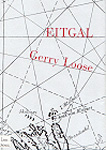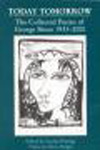Tracey Herd
The Abbot of Skellig Michael
 Dead Redhead (Bloodaxe pbk £7.95) by Tracey Herd is a darkly disturbing collection of poems filled with ‘defiant women who give themselves to life’ say the cover notes – though it might be more true to say they give themselves defiantly to death. There is barely anyone alive in this book. There are paintings, there are sculptures and fictional characters – and there are the dead: the sadly glamorous dead, the badly used and the brutally murdered. This is not an easy book to read, for seldom can a poet have achieved an elegaic volume of such sustained darkness and violence. But then, these women would otherwise have no voice, and Herd’s writing is challenging, confident, controlled – and defiantly individual.
Dead Redhead (Bloodaxe pbk £7.95) by Tracey Herd is a darkly disturbing collection of poems filled with ‘defiant women who give themselves to life’ say the cover notes – though it might be more true to say they give themselves defiantly to death. There is barely anyone alive in this book. There are paintings, there are sculptures and fictional characters – and there are the dead: the sadly glamorous dead, the badly used and the brutally murdered. This is not an easy book to read, for seldom can a poet have achieved an elegaic volume of such sustained darkness and violence. But then, these women would otherwise have no voice, and Herd’s writing is challenging, confident, controlled – and defiantly individual.
 In Eitgal (Mariscat Press pbk £5.00), dedicated to the eponymous ninth-century Abbot of Skellig Michael, off the coast of Kerry, Gerry Loose has produced a sequence of poems which must be among the most authentic and intense evocations of monastic experience. The lines have a clipped, stacatto feel, with occasional baroque decorations. At the same time, internal rhymes, half-rhymes and sound rhymes create a pace that is keen-edged, like a west-coast wind. You can imagine the man, half-demented almost, totally immersed in his religion, in the weather and in the bleakness of a place that allows him to scoff at the relative softness of Columba’s Iona – nothing between himself and his God but a kind of monastic hysteria. In these poems the monk’s chant has become a rant, and then a mantra of faith driven to its extremes until it has become a curse, a stone that grinds men to the thinness of a sacramental host. By the end, this man, who has lived on prayer and little else, announces that ‘I have forgotten what my words mean.’
In Eitgal (Mariscat Press pbk £5.00), dedicated to the eponymous ninth-century Abbot of Skellig Michael, off the coast of Kerry, Gerry Loose has produced a sequence of poems which must be among the most authentic and intense evocations of monastic experience. The lines have a clipped, stacatto feel, with occasional baroque decorations. At the same time, internal rhymes, half-rhymes and sound rhymes create a pace that is keen-edged, like a west-coast wind. You can imagine the man, half-demented almost, totally immersed in his religion, in the weather and in the bleakness of a place that allows him to scoff at the relative softness of Columba’s Iona – nothing between himself and his God but a kind of monastic hysteria. In these poems the monk’s chant has become a rant, and then a mantra of faith driven to its extremes until it has become a curse, a stone that grinds men to the thinness of a sacramental host. By the end, this man, who has lived on prayer and little else, announces that ‘I have forgotten what my words mean.’
 Working into his nineties, George Bruce wrote poetry since the age of seven. Today Tomorrow (Polygon pbk £14.99) his collected works from 1933-2000, edited by Lucinda Prestige, brings together over 200 poems from early unpublished poems to his 1999 prize-winning Pursuit, and later poems. Throughout these years, Bruce observed with a constant eye the landscape and the folk around his native North-East coast. His faithfulness to place is reminiscent of William Carlos Williams, whose influence Bruce acknowledged. The echo of Williams is readily apparent in ‘North Coast Cherries’ – ‘Against the wall / that faced south / sweet red cherries / enjoyed by stealing boys’. Bruce offers us his poems like gifts, repaying the gift of his inspiration.
Working into his nineties, George Bruce wrote poetry since the age of seven. Today Tomorrow (Polygon pbk £14.99) his collected works from 1933-2000, edited by Lucinda Prestige, brings together over 200 poems from early unpublished poems to his 1999 prize-winning Pursuit, and later poems. Throughout these years, Bruce observed with a constant eye the landscape and the folk around his native North-East coast. His faithfulness to place is reminiscent of William Carlos Williams, whose influence Bruce acknowledged. The echo of Williams is readily apparent in ‘North Coast Cherries’ – ‘Against the wall / that faced south / sweet red cherries / enjoyed by stealing boys’. Bruce offers us his poems like gifts, repaying the gift of his inspiration.
Copyright Chris McKinnell 2005.

Comments